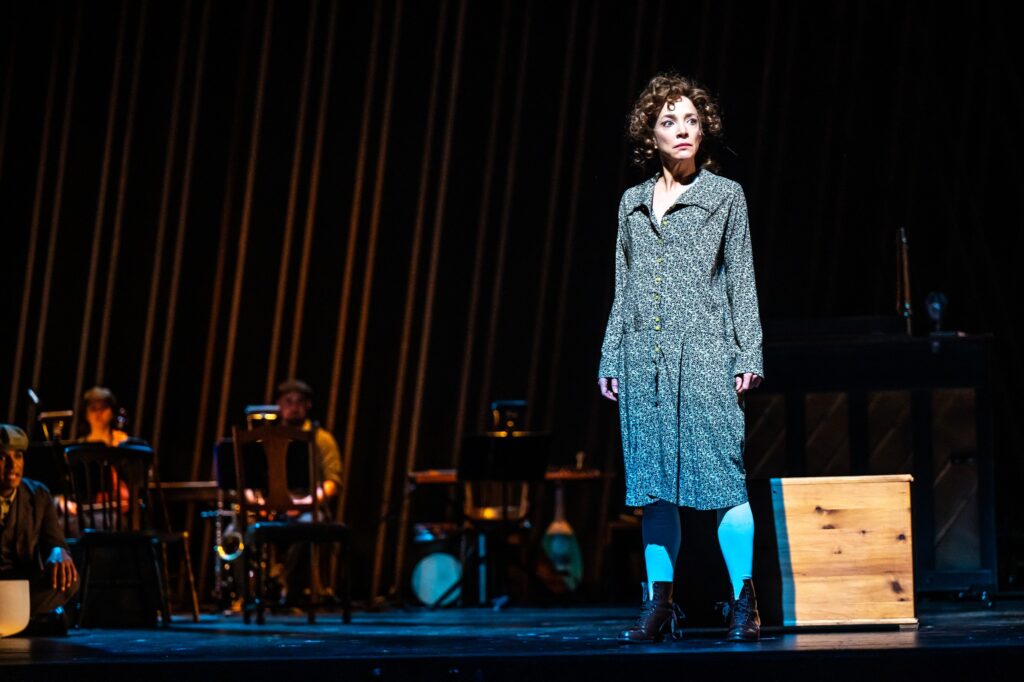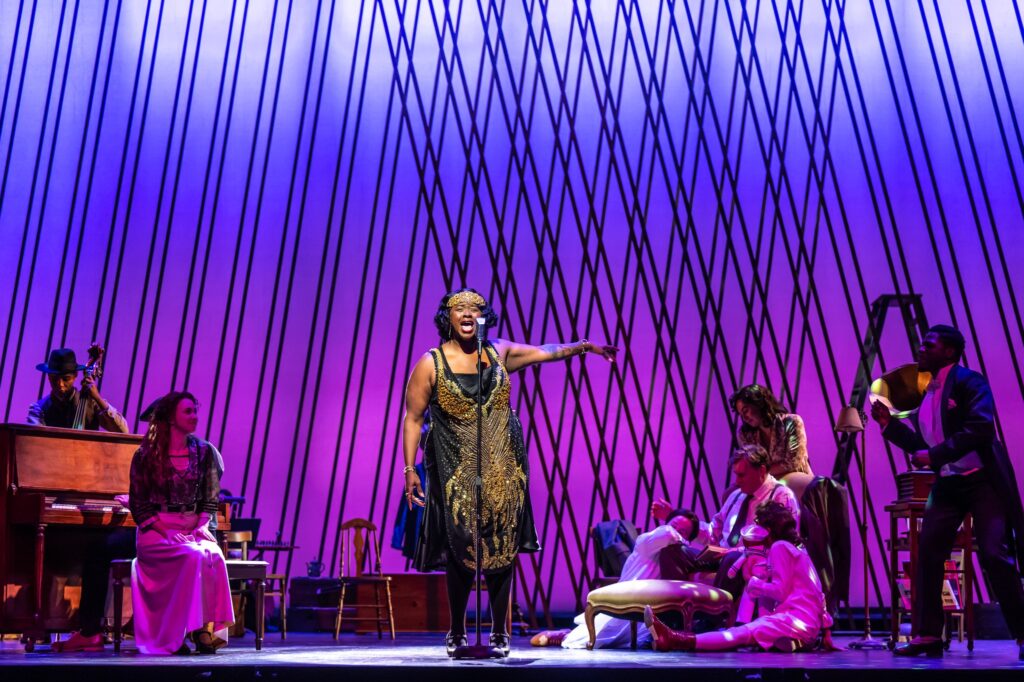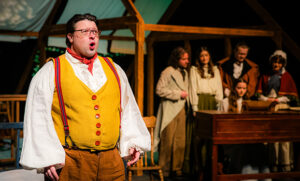
At the end of the First Act of Fall On Your Knees Part 1: Family Tree, an adaptation of Ann-Marie MacDonald’s bestselling novel by Hannah Moscovitch now playing at Neptune Theatre, I turned to my friend beside me and breathlessly whispered, “Isn’t this the best thing you have ever seen?” That sounds hyperbolic, but over the six hours this play in two parts truly transported me out of Halifax in 2023 and utterly immersed me in the often harrowing, always complex, deeply moving world of the Piper sisters and their community of New Waterford, Cape Breton in the early decades of the 20th Century. I felt I was living the play along with the actors, and judging from the constant gasps and visceral exclamations from audience members around me, I obviously wasn’t the only one feeling this play vibrate in my soul.
The story begins with an intensely problematic marriage between nineteen year old James Piper, of Scottish descent, and thirteen year old Materia Mahmoud, of Lebanese descent, which leaves Materia disowned by her family. When James realizes that Materia still behaves very much like a child, since she is one, and is struggling to meet his expectations as a housewife and mother to their children, he becomes enraged, resentful, and physically violent. James’ uncontrolled emotions, along with a mixture of racism and misogyny, permeates continually throughout their home, and takes on an even more sinister and disturbing tone as time goes by. This leaves lasting and devastating impacts not just on Materia but also on their daughters: Kathleen, Mercedes, and Frances, all the Pipers who come after them, and on their small community as a whole.
The crux of the play is the exploration of family secrets in an environment where communication is difficult or altogether absent, and where fists are used often instead of words. Mercedes, beautifully played by Jenny L. Wright, the middle child desperate to transform her family into one of stability and security through her own sense of responsibility and piety, finds it easier to confide her thoughts and feelings to Sister St. Monica than allow Frances, Lily, or James to see her express her worries, fears, or doubts. Frances, the youngest, is desperate for answers to the mysteries surrounding what happened to Kathleen in New York. Who was the father of Kathleen’s twins, Lily and Ambrose? And how did Ambrose come to drown in the creek the night he was born? In our search for answers to these questions in Part 2 we follow Kathleen, and then Lily from New Waterford to New York City, where we see that even the most promising of new beginnings are never entirely untethered from the trauma of the past.
The play is also very much about New Waterford and the intersection of cultures and communities and how they interacted with one another roughly one hundred years ago. Diane Flacks plays Mrs. Luvovitz, a recent Jewish immigrant who is deeply concerned about the wellbeing of Materia in her marriage. She insists on helping the family to the best of her ability when the Piper children are small and a strong friendship develops between Mercedes and her son Ralph (played with lovely earnestness by Drew Moore). Adelaide Taylor (played by Janelle Cooper) is a Black neighbour who also shows deep concern for Materia. Yet in both cases the deeply rooted systemic racism, antisemitism, and misogyny in their society keeps them from being able to connect ardently with one another and form what could have been life-saving friendships, rich familial bonds, and a neighbourhood built on mutual respect, care, and empathy. This dynamic is further complicated when Kathleen meets her friend Rose LaCroix, a Black classical pianist from Harlem, in New York City, and we see how race is still being weaponized, even though Kathleen has a very strong affinity for Rose. Director Alisa Palmer keeps most of the ensemble onstage during the scenes in Cape Breton, which gives us a sense of a place where you cannot escape your neighbours’ stare, and yet, even with all those eyes on James, no one was able to step in to save Materia, Kathleen, Mercedes, Frances, Lily, or Ambrose.
All the actors in the production give incredible rich and nuanced performances. The rapidity at which Cara Rebecca’s Materia goes from a chirpy, hyper little girl filled with fanciful dreams and naive exuberance to a woman aged far beyond her years whose soul has been entirely drained from her, and is simply mustering the very last of her reserve for the benefit of her children, is astounding. Janelle Cooper brings great ferocity to Adelaide Taylor, establishing in very little time the stakes involved here for her family due to Frances’ deeply misguided and problematic antics with her husband, Leo, very well played by Tony Ofori. Cooper then treats us to joyful jazz standards as Sweet Jessie Hogan, the singer who makes Kathleen fall in love with popular music in New York. These musical interludes do wonders to help give a lift from the darkness of the story and roots us firmly in time and place. Eva Foote plays Lily Piper, the one family member who seems to float more easily above the mire. Foote gives Lily a very gentle touch, and quiet thoughtfulness, which is especially notable in her relationship with James. Samantha Hill plays Kathleen Piper, who grows up alienated from her mother and spoiled by her father, which contributes to the toxic atmosphere at home. Hill does a great job at balancing an intense attachment to her father, with an independent spirit, and it’s beautiful to watch her really come into her own in New York City. I especially liked that, despite her gorgeous angelic voice, it’s when she starts to feel more comfortable in New York that she emerges as a kind of iconic scrappy New Waterford Girl. You can take the girl out of New Waterford, but you can’t take New Waterford out of the girl, as they say. Amaka Umeh plays Rose/Doc LaCroix the person who pushes Kathleen to find the truest part of herself and allows her to really begin to shine, both as a singer and, more importantly, as a person. Rose also undergoes a dramatic transformation and forges a new life for herself with the encouragement of Kathleen. Umeh brings great subtlety to a character that doesn’t have a lot of stage time, but who is so integral to the story, especially since she holds the key to one of the Pipers’ mysteries. Tim Campbell has the difficult role of James Piper, a deeply flawed husband and father, who could very well be portrayed as the moustache-twirling villain of the story, but instead, Campbell truly walks the fine line between monstrosity and humanity, in a way that I think does beautiful justice to the way that he was written in MacDonald’s novel. It’s a performance that is hard to watch at times, it can be physically nauseating, completely devastating, and yet, infuriatingly, but I think also accurately, it can be sometimes quite poignant as well.

Jenny L. Wright plays long-suffering Mercedes Piper and it’s Mercedes in the family, both in Wright’s detailed portrayal, but also in the way she is written, who seems to me to have just been plucked from New Waterford’s past and brought here in some kind of time travelling expedition. Mercedes is the witness, so she is in some ways representative of the audience on stage, which makes the fact that Wright feels so reflective of “us,” as Nova Scotians, or as Cape Bretoners, whichever the case may be, an even more powerful connection. Deborah Hay plays Frances, who is certainly the funniest character, but who is also, arguably, the most devastating, which is an extremely difficult arc to manage. Hay is giving what I think is a once in a lifetime performance in this play, perhaps not that she will never give one better, but it is so unique and brilliant, we the audience are unlikely to see anything remotely akin to it again. We see Frances grow up from birth, initially she is a sweet, curious, extremely precocious little girl who idolizes her big sisters, while also very much marching to the beat of her own drummer. She grows up to become a rebellious student and then a kind of exuberant sex worker who performs seemingly hilarious stripteases at her estranged uncle’s dive bar. Yet Little Frances is always deeply resonate in Slightly Older Frances, and she is obsessed with the idea of righting a wrong she is sure that she had some part of committing when she was a child. Hay is akin to a emotionally ravaged Carol Burnett, channelling all her guilt, shame, anger, hurt, confusion, and trauma into a need to make other people laugh and feel better, including us in the audience. She is our much-needed comic relief, and I think it is difficult not to throughly love Frances, and to follow her journey, despite her problematic choices, which at times threaten the lives of others, with a lot of empathy and compassion. This is a truly exceptional performance with so many nuanced layers, deep pathos, and silliness where silliness is the most unexpected, and yet the most needed.
Moscovitch’s adaptation of MacDonald’s novel is quite remarkable in that she has very deftly converted a largely narrative-driven work into a dialogue-based play, while still retaining a lot of MacDonald’s signature humour and the overall spirit of the book. Moscovitch never over-writes her plays, which leaves Palmer with lots of room to create pictures in the direction, which also help to move the story along well. This also connects beautifully to the recurrent theme of photographs so important in the novel. We do get the sense that we are seeing various snapshots of formative times in this family’s life, and that they are out of order and require us to help piece them into a narrative that makes sense, whether it’s the narrative the characters are hoping for or not. Palmer has filled the stage with so much to see and this helps us to remember that this family exists within a larger context: a neighbourhood, a town, a province, a country… and that all of this informs who these people are, how they interact with one another, and the way this story goes. The violence portrayed onstage, with fight choreography by Anita Nittoly is unflinching and tough to watch. I heard many people in the audience viscerally responding to the play’s most intense scenes. In reality, these moments are hidden within the walls of a home, but we are being asked as audience members to acknowledge it out in the light and not to allow it to simply fade from our collective consciousness. This play does not allow us to be complacent observers, we are part of the ensemble that Palmer has positioned around the story; now our eyes are on the Pipers too.
It’s apt that the play is called Fall On Your Knees, as I think the experience could make one so overcome with emotion by the end they may feel moved to express a sweeping gesture of gratitude toward all of the many, many folks who have worked so hard to bring this epic story to life, to the stage, and to Halifax. I certainly feel extremely lucky to have seen it. I hope a great many of you will have the opportunity to experience it for yourselves.
Fall On Your Knees plays at Neptune Theatre’s Fountain Hall Stage (1591 Argyle Street) until March 5, 2023. The play is performed in Two Parts, so you will need to purchase tickets for both. Shows are Tuesday to Friday at 7:30pm and Saturday and Sunday at both 1:00pm and 7:30pm. Part 1 is 3 hours with one intermission. Part 2 is 3 hours with two intermissions. I found the time flew by. Industry Night is after Part 1 on Tuesday February 14th, and Talk Back Night is after Part 2 on Thursday February 23rd. This show is a co-production between Neptune Theatre, Canadian Stage, The National Arts Centre, Vita Brevis Arts, and the Grand Theatre. Tickets are available online at this website, by calling the Box Office at 902.429.7070 or visiting the Box Office in person at 1591 Argyle Street. Tickets range in price from $38.00-$78.00 (based on seating). Neptune is fully accessible for wheelchair users. For more information about Accessibility please visit this website.
Fall On Your Knees will play at the National Arts Centre in Ottawa from March 8-25, 2023 and then at The Grand Theatre in London, Ontario from March 29th to April 2nd, 2023.







3 thoughts on “Theatre Adaptation of Fall On Your Knees is a Glorious Achievement”
Comments are closed.